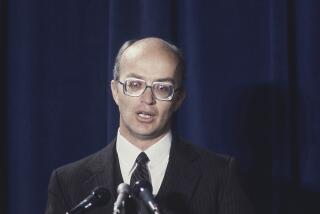John Breaux, Hero or Hack?
- Share via
When the White House appointed retired Sen. John B. Breaux (D-La.) to co-chair its commission on tax reform last week, newspapers described him, as they always do, with phrases like “moderate,” “valuable broker between the parties” and “legendary dealmaker.” Given the conventions of objective journalism, a truly accurate description, like “repellent sleazebag,” might be too much to expect. But was it truly necessary to shower him with such lofty descriptions?
It’s typical of the unfathomable esteem in which Breaux is held that only one news outlet saw fit to mention his current occupation: Washington lawyer, which is code for lobbyist. Breaux works for the law firm Patton Boggs, a notorious influence broker, and also represents two New York investment firms. These are pretty important details, given that his clients could have a strong stake in whatever tax changes Breaux’s commission recommends.
To the one newspaper that noted Breaux’s lobbying conflict of interest -- the New Orleans Times-Picayune -- Breaux offered four insipid defenses. First, he noted that the law prohibits him from lobbying for a year after leaving the Senate, by which time his commission will have expired. But what’s against the law is a narrow category of activity -- directly contacting federal officials, a tiny part of what lobbyists do. It wouldn’t stop him from using the commission to benefit his clients.
Second, Breaux said that at Patton Boggs and in his own practice he “will be careful not to represent clients with tax- related issues.” Of course, since every business would like to pay less in taxes, that means either Breaux will have no clients or he’s lying.
Third, Breaux told the Times-Picayune “we are talking about future tax reform.” His clients “would all play by whatever rules are in existence at the time.” But the worry isn’t that Breaux’s clients will break the law; it’s that they’ll prevail upon him to recommend laws favorable to them.
Finally, Breaux offered up this gem: “I talked with the White House about this.” Somehow, relying on the Bush administration’s sensitivity to the dangers of lobbyists wielding undue clout fails to put one’s mind at ease.
It’s sadly unsurprising that Breaux’s conflict of interest escaped the media’s attention. He has made a career of passing off tawdriness as statesmanship, all because he brilliantly identified himself with two concepts that make official Washington swoon. The first is moderation. It is always effective to identify yourself as a centrist willing to transcend party dogma. But Breaux was no Clinton-style New Democrat, thoughtfully searching for new ways his party could solve the nation’s problems. He was moderate in the very Old Democrat style -- 1950s old -- loyally and unapologetically carrying water for his state’s business interests.
Breaux has likewise identified himself with “governing,” that is to say, passing laws. Establishment Washington identifies passing bills as progress, especially if those bills enjoy support from both parties. Breaux embraced this notion with zeal. In almost every instance, he found legislation preferable to no legislation. By a further coincidence, he almost always found himself halfway between the two parties, so that he became a central player in the negotiations.
Here, for instance, is Breaux’s defense of the Bush tax cuts, which he helped broker: “Is this budget a perfect document? Of course not. But does it advance the cause of governing in a democracy that is almost evenly divided among the two parties? I think the answer is yes, it does.” Got that? “Governing” means passing a bill, regardless of its effect on the national interest. If communists had won the election, Breaux would have urged both parties to sit down and work out the best forced farm collectivization bill they could.
In 1981, Breaux supported one of President Reagan’s budgets on the condition that Reagan preserve tariffs on imported sugar -- a loathsome form of corporate welfare that raises food prices and hurts the poor in order to subsidize the sugar industry, much of which is based in Louisiana.
At the time, he commented that his vote could not be bought, “but it can be rented.” National Public Radio host Michele Norris cited this line last year in the course of flattering Breaux in a valedictory interview. Amazingly, Norris interpreted this episode not as corruption but as bipartisanship.
“It’s a wonderful story, but it is also a snapshot of a time there, a time when you could work both sides of the aisle,” she sighed wistfully. Ah. What a valuable broker he is.
More to Read
Sign up for Essential California
The most important California stories and recommendations in your inbox every morning.
You may occasionally receive promotional content from the Los Angeles Times.













